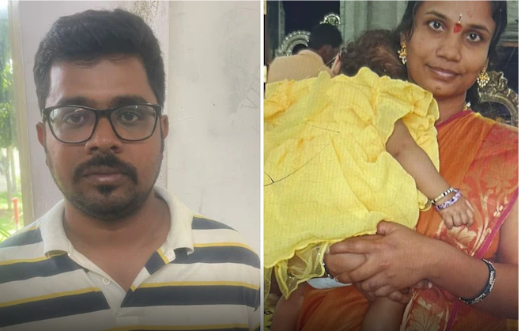– Mohammed Talha Siddi Bapa
In Bommanahalli, Bengaluru, a 29-year-old woman named Padmaja was brutally strangled to death – by her husband. Her crime? She went shopping.
This horrific incident unfolded on July 6, when Padmaja returned home after shopping. A seemingly ordinary act – routine, necessary, and harmless – turned fatal because it had happened without her husband’s “permission.” Harish Kumar, a 32-year-old unemployed engineer reportedly struggling with alcoholism, erupted in rage. According to the police and their child’s testimony, an argument broke out, and in a drunken fury, Harish pushed Padmaja to the ground and strangled her, pressing his knee against her neck mercilessly – in front of their child – until she died!
The case came to light only after the hospital alerted the police, prompting an investigation. Neighbours and family members confirmed that Harish and Padmaja had frequent quarrels, often sparked by his drinking and growing frustration. Harish is now in custody, and police have filed a case under the relevant sections of the IPC.
But this is more than just a murder case. This is a chilling example of how control, patriarchy, and moral decay quietly thrive in our homes – behind closed doors – often disguised as “family issues,” and only noticed when someone dies.
A Society Normalising Violence
Padmaja’s death is not an isolated tragedy. Within the span of just a few days, multiple reports have emerged of women being raped, assaulted, or murdered in the very spaces they’re expected to be safe. These crimes are often treated as routine – reported in brief columns once the FIR is filed, discussed in hushed tones, and forgotten soon after.
But behind every such line of police-speak lies a deeper, darker question: What kind of society have we become, where a woman can be killed simply for stepping outside her house?
We claim to be a progressive nation, boasting of religiosity, rising literacy, and rapid urbanisation. But if a man still feels entitled to kill his wife over shopping – if a woman’s autonomy still invites violence – then the roots of our progress are rotten. Padmaja held a degree in Electronics and Communication. She was educated, trying to raise a family despite her husband’s addiction and unemployment. Her only crime was standing up for herself – and it proved fatal.
The Monster Within the Marriage
Domestic violence is not new to India. But the silence around it – both within families and institutions – is deafening. Most women don’t report abuse. Society encourages them to “adjust,” “compromise,” or stay for the children’s sake. Even neighbours, friends, and relatives often turn a blind eye – until something irreversible happens.
In this case, Harish didn’t simply lose control. He exercised the control he believed he had. And that is the essence of toxic patriarchy: the belief that a woman’s body, time, and choices belong to a man. When that illusion breaks, violence follows. And the worst part? So many in our society still see this as “a domestic matter” – not as a social crime rooted in misogyny and entitlement.
Beyond the FIR: Where Is Our Outrage?
The police did their job. They arrested Harish. But is that enough?
Where is the editorial outrage? Where are the televised debates? Why isn’t this case being discussed in our schools, colleges, and community spaces – as a warning, as a mirror?
Journalism has become formulaic – crime reported only when the FIR is filed, and the victim’s story reduced to a name and age. But Padmaja’s story is a window into hundreds of such untold tragedies – many without bodies, without headlines, without justice.
What Must Change
This is the moment for society to ask itself hard questions. We need:
- Mandatory domestic violence counselling in all urban housing societies;
- Helplines that actually respond – not just exist in theory;
- Community-based monitoring systems that empower neighbours to report abuse safely; and
- A media ecosystem that goes beyond headlines, and begins to investigate the moral and systemic failures behind such crimes.
Above all, we need to teach boys and men that women are not property. A marriage is not ownership. A husband is not a master.
Padmaja’s Death Is on All of Us
We failed Padmaja long before she died. We failed her when we allowed a culture where male frustration is expressed through fists. Where addiction becomes an excuse. Where women still need “permission” to go shopping. Where a crime becomes news only when it becomes a corpse.
Let’s not reduce her to a case number. Let’s make her story a call to conscience – loud enough to pierce every silent home where control is still mistaken for love.




